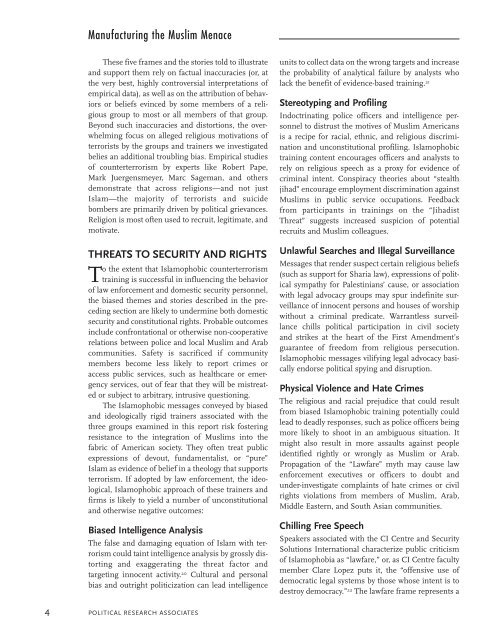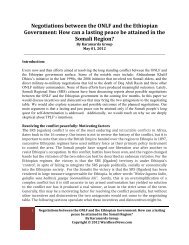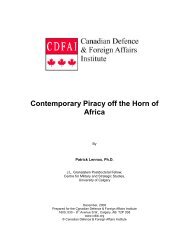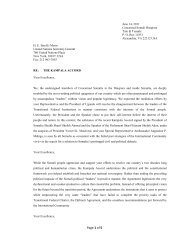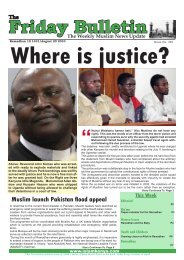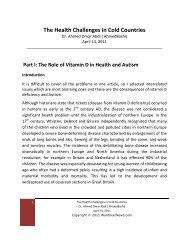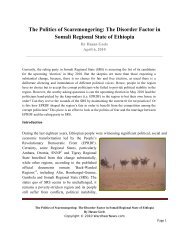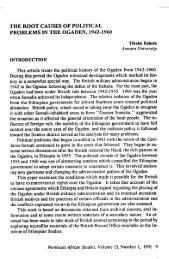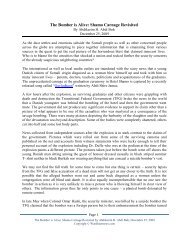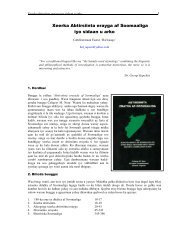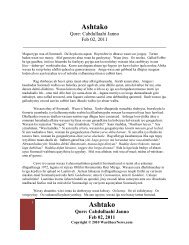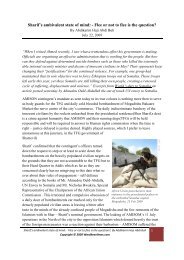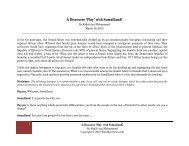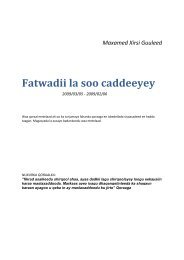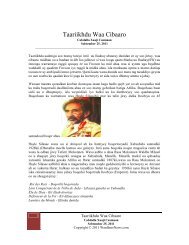Manufacturing the Muslim Menace - Political Research Associates
Manufacturing the Muslim Menace - Political Research Associates
Manufacturing the Muslim Menace - Political Research Associates
Create successful ePaper yourself
Turn your PDF publications into a flip-book with our unique Google optimized e-Paper software.
4<br />
<strong>Manufacturing</strong> <strong>the</strong> <strong>Muslim</strong> <strong>Menace</strong><br />
These five frames and <strong>the</strong> stories told to illustrate<br />
and support <strong>the</strong>m rely on factual inaccuracies (or, at<br />
<strong>the</strong> very best, highly controversial interpretations of<br />
empirical data), as well as on <strong>the</strong> attribution of behaviors<br />
or beliefs evinced by some members of a religious<br />
group to most or all members of that group.<br />
Beyond such inaccuracies and distortions, <strong>the</strong> overwhelming<br />
focus on alleged religious motivations of<br />
terrorists by <strong>the</strong> groups and trainers we investigated<br />
belies an additional troubling bias. Empirical studies<br />
of counterterrorism by experts like Robert Pape,<br />
Mark Juergensmeyer, Marc Sageman, and o<strong>the</strong>rs<br />
demonstrate that across religions—and not just<br />
Islam—<strong>the</strong> majority of terrorists and suicide<br />
bombers are primarily driven by political grievances.<br />
Religion is most often used to recruit, legitimate, and<br />
motivate.<br />
THREATS TO SECURITY AND RIGHTS<br />
To <strong>the</strong> extent that Islamophobic counterterrorism<br />
training is successful in influencing <strong>the</strong> behavior<br />
of law enforcement and domestic security personnel,<br />
<strong>the</strong> biased <strong>the</strong>mes and stories described in <strong>the</strong> preceding<br />
section are likely to undermine both domestic<br />
security and constitutional rights. Probable outcomes<br />
include confrontational or o<strong>the</strong>rwise non-cooperative<br />
relations between police and local <strong>Muslim</strong> and Arab<br />
communities. Safety is sacrificed if community<br />
members become less likely to report crimes or<br />
access public services, such as healthcare or emergency<br />
services, out of fear that <strong>the</strong>y will be mistreated<br />
or subject to arbitrary, intrusive questioning.<br />
The Islamophobic messages conveyed by biased<br />
and ideologically rigid trainers associated with <strong>the</strong><br />
three groups examined in this report risk fostering<br />
resistance to <strong>the</strong> integration of <strong>Muslim</strong>s into <strong>the</strong><br />
fabric of American society. They often treat public<br />
expressions of devout, fundamentalist, or “pure”<br />
Islam as evidence of belief in a <strong>the</strong>ology that supports<br />
terrorism. If adopted by law enforcement, <strong>the</strong> ideological,<br />
Islamophobic approach of <strong>the</strong>se trainers and<br />
firms is likely to yield a number of unconstitutional<br />
and o<strong>the</strong>rwise negative outcomes:<br />
Biased Intelligence Analysis<br />
The false and damaging equation of Islam with terrorism<br />
could taint intelligence analysis by grossly distorting<br />
and exaggerating <strong>the</strong> threat factor and<br />
targeting innocent activity. 20 Cultural and personal<br />
bias and outright politicization can lead intelligence<br />
POLITICAL RESEARCH ASSOCIATES<br />
units to collect data on <strong>the</strong> wrong targets and increase<br />
<strong>the</strong> probability of analytical failure by analysts who<br />
lack <strong>the</strong> benefit of evidence-based training. 21<br />
Stereotyping and Profiling<br />
Indoctrinating police officers and intelligence personnel<br />
to distrust <strong>the</strong> motives of <strong>Muslim</strong> Americans<br />
is a recipe for racial, ethnic, and religious discrimination<br />
and unconstitutional profiling. Islamophobic<br />
training content encourages officers and analysts to<br />
rely on religious speech as a proxy for evidence of<br />
criminal intent. Conspiracy <strong>the</strong>ories about “stealth<br />
jihad” encourage employment discrimination against<br />
<strong>Muslim</strong>s in public service occupations. Feedback<br />
from participants in trainings on <strong>the</strong> “Jihadist<br />
Threat” suggests increased suspicion of potential<br />
recruits and <strong>Muslim</strong> colleagues.<br />
Unlawful Searches and Illegal Surveillance<br />
Messages that render suspect certain religious beliefs<br />
(such as support for Sharia law), expressions of political<br />
sympathy for Palestinians’ cause, or association<br />
with legal advocacy groups may spur indefinite surveillance<br />
of innocent persons and houses of worship<br />
without a criminal predicate. Warrantless surveillance<br />
chills political participation in civil society<br />
and strikes at <strong>the</strong> heart of <strong>the</strong> First Amendment’s<br />
guarantee of freedom from religious persecution.<br />
Islamophobic messages vilifying legal advocacy basically<br />
endorse political spying and disruption.<br />
Physical Violence and Hate Crimes<br />
The religious and racial prejudice that could result<br />
from biased Islamophobic training potentially could<br />
lead to deadly responses, such as police officers being<br />
more likely to shoot in an ambiguous situation. It<br />
might also result in more assaults against people<br />
identified rightly or wrongly as <strong>Muslim</strong> or Arab.<br />
Propagation of <strong>the</strong> “Lawfare” myth may cause law<br />
enforcement executives or officers to doubt and<br />
under-investigate complaints of hate crimes or civil<br />
rights violations from members of <strong>Muslim</strong>, Arab,<br />
Middle Eastern, and South Asian communities.<br />
Chilling Free Speech<br />
Speakers associated with <strong>the</strong> CI Centre and Security<br />
Solutions International characterize public criticism<br />
of Islamophobia as “lawfare,” or, as CI Centre faculty<br />
member Clare Lopez puts it, <strong>the</strong> “offensive use of<br />
democratic legal systems by those whose intent is to<br />
destroy democracy.” 22 The lawfare frame represents a


